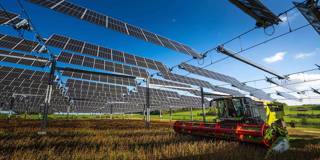European policymakers can fight both rising food costs and climate change by reducing incentives for industrial meat production. Even a 13% cut in the EU’s meat production would be enough to offset the loss of Ukrainian grain exports, reduce food insecurity in developing countries, and ease food price increases.
DENVER/BRUSSELS – European countries are experiencing their worst cost-of-living crisis in decades, owing to surging energy and food costs. COVID-19, the war in Ukraine, and climate change have compounded the increase in commodity prices, leading to food shortages and rapidly rising food insecurity in the developing world. But there is good news: with a simple (but critical) change in food production, the European Union can ease food-price inflation and bolster global food supplies.

DENVER/BRUSSELS – European countries are experiencing their worst cost-of-living crisis in decades, owing to surging energy and food costs. COVID-19, the war in Ukraine, and climate change have compounded the increase in commodity prices, leading to food shortages and rapidly rising food insecurity in the developing world. But there is good news: with a simple (but critical) change in food production, the European Union can ease food-price inflation and bolster global food supplies.